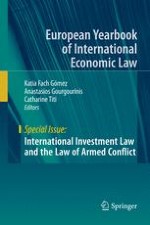
2019 | OriginalPaper | Buchkapitel
War and Peace in International Investment Law
verfasst von : Christoph Schreuer
Erschienen in: International Investment Law and the Law of Armed Conflict
Verlag: Springer International Publishing
Aktivieren Sie unsere intelligente Suche, um passende Fachinhalte oder Patente zu finden.
Wählen Sie Textabschnitte aus um mit Künstlicher Intelligenz passenden Patente zu finden. powered by
Markieren Sie Textabschnitte, um KI-gestützt weitere passende Inhalte zu finden. powered by